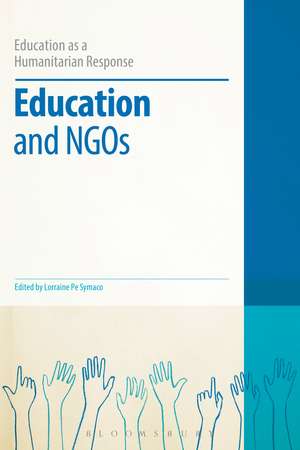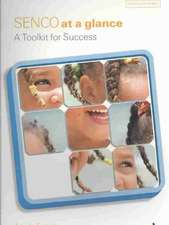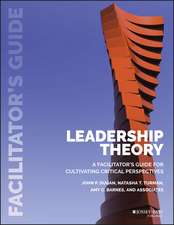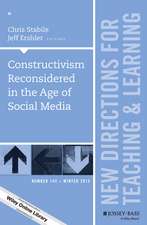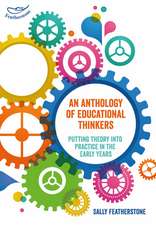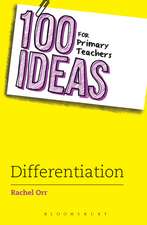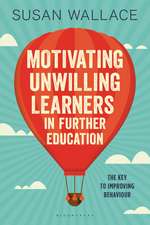Education and NGOs: Education as a Humanitarian Response
Editat de Dr Lorraine Pe Symaco Prefață de Dr Colin Brocken Limba Engleză Paperback – 10 feb 2016
| Toate formatele și edițiile | Preț | Express |
|---|---|---|
| Paperback (1) | 250.01 lei 6-8 săpt. | |
| Bloomsbury Publishing – 10 feb 2016 | 250.01 lei 6-8 săpt. | |
| Hardback (1) | 889.49 lei 6-8 săpt. | |
| Bloomsbury Publishing – 10 feb 2016 | 889.49 lei 6-8 săpt. |
Preț: 250.01 lei
Nou
Puncte Express: 375
Preț estimativ în valută:
47.84€ • 50.07$ • 39.82£
47.84€ • 50.07$ • 39.82£
Carte tipărită la comandă
Livrare economică 31 martie-14 aprilie
Preluare comenzi: 021 569.72.76
Specificații
ISBN-13: 9781472589668
ISBN-10: 1472589661
Pagini: 208
Dimensiuni: 156 x 234 x 13 mm
Greutate: 0.32 kg
Editura: Bloomsbury Publishing
Colecția Bloomsbury Academic
Seria Education as a Humanitarian Response
Locul publicării:London, United Kingdom
ISBN-10: 1472589661
Pagini: 208
Dimensiuni: 156 x 234 x 13 mm
Greutate: 0.32 kg
Editura: Bloomsbury Publishing
Colecția Bloomsbury Academic
Seria Education as a Humanitarian Response
Locul publicării:London, United Kingdom
Caracteristici
The first global overview of the role of non-governmental organizations in education, filling a substantial gap in the market
Notă biografică
Lorraine Pe Symaco is Director of the Centre for Research in International and Comparative Education (CRICE) at the University of Malaya, Malaysia.
Cuprins
Series Editor's PrefaceIntroduction, Lorraine Pe Symaco (University of Malaya, Malaysia)1. The Role of NGOs in Supporting Education in Africa, Michael Brophy 2. Education and NGOs in Ecuador, Rosalia Arteaga (Advisory Council of the Latin American Foundation for the Integration and Development)3. Non-Governmental Provision of Education in the Gaza Strip, Lucy Thirkell (University of Cambridge, UK)4. Going to School Programme in India, Ch. Radha Gayathri (Jawaharlal Nehru University, India) and Lisa Heydlauff (Going to School, India)5. High Impact Tourism Training (HITT) Programme in Nepal, Jonathan Demenge (Swiss Agency for Development and Cooperation, Switzerland) and Bibek Shrestha (Alternative Energy Promotion Centre, Nepal)6. Education and NGOs in the Philippines, Benjamin Diokno (University of the Philippines, Philippines) and Lorraine Pe Symaco (University of Malaya, Malaysia)7. The Work of Borien Educational Foundation for Southern Africa (BEFSA) in the Eastern Cape, Keith Borien (Borien Educational Foundation for Southern Africa, South Africa)8. Educating Vulnerable Children in the UK, Camila Batmanghelidjh (Kids Company, UK)9. The Role of NGOs and Educational Partnerships in the USA, Caroline Collins (University California, San Diego, USA)Index
Recenzii
This book is a very enjoyable and instructive read which brings together a number of rich and very diverse articles.
Education and NGOs provides a rich and diverse source of case study material on the operation, effects and costs of NGOs in education. Proponents of neo-liberalism will welcome evidence of the contributions made by NGOs, critics may focus on their negative effects on public education systems. Altogether, this is a valuable collection of information for both scholars and practitioners.
Education and NGOs presents a balanced and critical account of a variety of organisations working in the education sector around the world. Case studies from Africa, Asia, Europe, North America and South America as well as the questions for reflection that accompany each chapter will prove useful to readers interested in learning more about the important, yet complicated role that NGOs play in international educational development.
This thought-provoking collection of essays brings together important comparative insights from practitioners and scholars working on education in different world contexts and within a number of NGOs, which histories, missions and reach illustrate the diverse and multiple contributions of NGOs to education. Taken together, the eight country studies provide a solid introduction to the various issues emerging from NGO engagement in education, particularly in the service of those who would otherwise be excluded.
Education and NGOs provides a rich and diverse source of case study material on the operation, effects and costs of NGOs in education. Proponents of neo-liberalism will welcome evidence of the contributions made by NGOs, critics may focus on their negative effects on public education systems. Altogether, this is a valuable collection of information for both scholars and practitioners.
Education and NGOs presents a balanced and critical account of a variety of organisations working in the education sector around the world. Case studies from Africa, Asia, Europe, North America and South America as well as the questions for reflection that accompany each chapter will prove useful to readers interested in learning more about the important, yet complicated role that NGOs play in international educational development.
This thought-provoking collection of essays brings together important comparative insights from practitioners and scholars working on education in different world contexts and within a number of NGOs, which histories, missions and reach illustrate the diverse and multiple contributions of NGOs to education. Taken together, the eight country studies provide a solid introduction to the various issues emerging from NGO engagement in education, particularly in the service of those who would otherwise be excluded.
